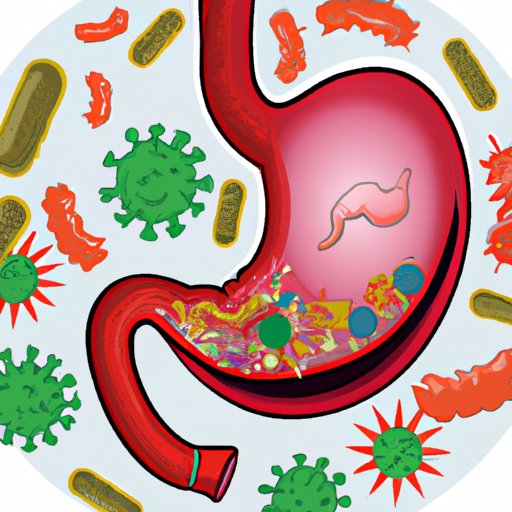
Introduction
A stomach bug, formally known as gastroenteritis, is a type of infection that affects the digestive system. It can be caused by a variety of bacteria, viruses, and parasites, and typically leads to symptoms such as nausea, vomiting, diarrhea, and stomach cramping. Understanding how stomach bugs are spread and how to prevent them is important for staying healthy and avoiding these unpleasant symptoms.
The Top 5 Sources of Stomach Bugs: What You Need to Know
Stomach bugs can be caused by multiple sources. Here are the top five sources to be aware of:
Contaminated food and water
Food and water can become contaminated with bacteria, viruses, or parasites in a variety of ways. Raw or undercooked meat or poultry, unwashed fruits and vegetables, improperly canned or packaged foods, and water from infected sources can all contain harmful germs that cause stomach bugs.
Person-to-person contact
Stomach bugs can spread rapidly in close quarters, especially in situations where hygiene practices are lax. If someone infected with a stomach bug touches surfaces or people after using the bathroom, they can easily pass on germs through handshakes, hugs, or other physical contact.
Fomites (inanimate objects that harbor germs)
Surfaces and objects that are frequently touched can also harbor germs that cause stomach bugs. Doorknobs, light switches, phones, and remote controls are all examples of fomites that can easily become contaminated and spread germs to people who touch them.
Poor hygiene
Practicing good hygiene is essential in preventing stomach bugs. Germs on unwashed hands, improperly cleaned surfaces, and dirty clothing can be easily transferred to others through contact or handling of food or other objects.
Exposure to animals
Some stomach bugs can be spread through contact with infected animals, their fecal matter, or their contaminated habitats. This includes pets, farm animals, and wildlife. Proper hand washing and sanitation practices can help prevent infections from animals.
From Contaminated Food to Person-to-Person Contact: Uncovering How Stomach Bugs Spread
Stomach bugs are caused by a variety of bacteria, viruses, and parasites. Here are some examples of specific stomach bugs and how they spread:
Common bacterial causes of stomach bugs
- Salmonella: Found in undercooked poultry, eggs, and meat. Can also be found in produce contaminated with animal feces. Can be spread through person-to-person contact, but is often caused by contaminated food or water sources.
- E. coli: Typically associated with contaminated food sources, such as undercooked meat, unpasteurized dairy, and fruits and vegetables that have been contaminated with animal feces.
- Campylobacter: Also associated with undercooked meat and poultry, but can also be found in untreated water sources or unpasteurized dairy products.
Common viral causes of stomach bugs
- Norovirus: Highly contagious and often spread through person-to-person contact, contaminated food, and water sources. Norovirus can survive on surfaces for several days, making it easy to spread.
- Rotavirus: Typically affects young children and can be spread through contaminated surfaces, as well as contaminated food and water.
- Hepatitis A: Spread through contaminated food or water, as well as close personal contact with someone who is infected.
How long stomach bugs can survive on different surfaces
Stomach bugs can survive on surfaces for varying lengths of time:
- Norovirus can survive on surfaces for up to two weeks.
- Campylobacter can survive on surfaces for up to four days.
- E.coli can survive on surfaces for up to two hours.
- Salmonella can survive on surfaces for up to four hours.
Preventing the Spread of Stomach Bugs: Tips for Staying Healthy
There are several steps you can take to prevent the spread of stomach bugs:
Washing your hands properly
Hand washing is one of the most effective ways to prevent the spread of stomach bugs. Always wash your hands thoroughly with soap and warm water after using the bathroom, eating, or preparing food.
Disinfecting surfaces
Cleaning and disinfecting surfaces that are frequently touched, such as doorknobs, light switches, and countertops, can help prevent the spread of germs.
Cooking food thoroughly
Properly cooking meat, poultry, and eggs can help kill harmful bacteria that cause stomach bugs. Always use a food thermometer to ensure that food is cooked to the appropriate temperature.
Practicing social distancing
During times of illness outbreaks, it’s important to practice social distancing. Avoid close personal contact with others and stay home if you’re feeling sick.
Staying home when you’re sick
If you do get sick with a stomach bug, it’s important to stay home until you’re feeling better. This will help prevent the spread of the infection to others.
Common Symptoms of Stomach Bugs: How to Avoid Getting Sick
Stomach bugs can cause a variety of symptoms, including:
Nausea and vomiting
These symptoms are often the first to appear and can last for several days.
Diarrhea
Loose, watery stools are common in stomach bug infections.
Stomach cramps
Abdominal pain and discomfort are common symptoms of stomach bugs.
Fever
Some stomach bugs can cause a fever, although this is less common.
Dehydration
Fluid loss through vomiting and diarrhea can lead to dehydration. It’s important to stay hydrated by drinking fluids and electrolyte replacement drinks.
The Science Behind Stomach Bugs: Understanding How They Infect the Body
Stomach bugs can enter the body through contaminated food or water, or through contact with other infected individuals or surfaces. Once inside the body, they can quickly multiply and cause symptoms such as nausea, vomiting, and diarrhea. Antibiotics are not always effective in treating stomach bugs, as they typically target bacterial infections and may not work on viral or parasitic infections.
Conclusion
Stomach bugs can be unpleasant and even dangerous in certain groups, such as young children, the elderly, and those with weakened immune systems. By understanding how stomach bugs are spread and how to prevent them, you can take steps to protect yourself and others from infection. Practicing good hygiene, staying home when sick, and properly cooking food are all important steps in preventing the spread of these common infections.




